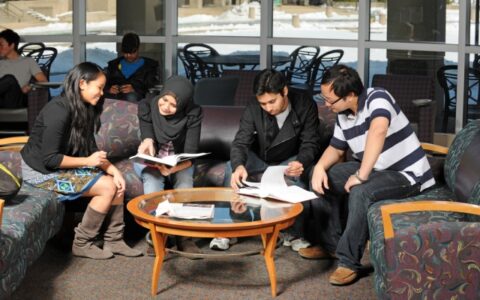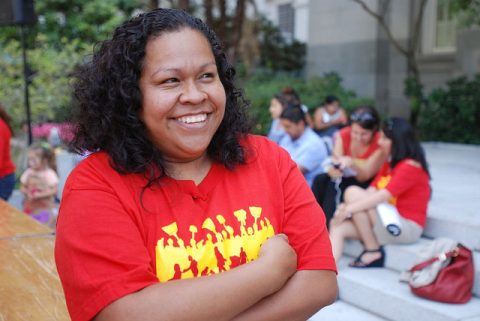Employment and Wages

Record Number of International Students Add $24 billion to U.S. Economy
A record number of international students studying in the U.S. contributed billions to the U.S. economy during the 2012-2013 academic year, according to an economic analysis by NAFSA: Association of International Educators. Over the academic year, international students and their families support 313,000 jobs and contributed $24 billion to the U.S. economy. The NAFSA report is based on enrollment data from the latest Open Doors Report from the Institute of International Education (IIE), which found that 819,644 international students studied in the U.S. during the 2012-2013 academic year. A growing number of students from China and Saudi Arabia led the 7 percent increase. And based on NAFSA’s analysis, the jump adds up to a 6.2 percent increase in job support creation and a 10 percent increase in dollars added to the U.S. economy over the previous academic year. Read More

How Would Immigration Reform Help the U.S. Economy?
A growing consensus has emerged among both liberals and conservatives that immigration reform would serve as a stimulus to the U.S. economy. Reform would not only raise the wages—and therefore the tax payments and consumer purchasing power—of newly legalized immigrants, but would ensure future flows of immigrant workers, taxpayers, and consumers that are sufficient to meet the labor-force needs of our rapidly aging society. Conversely, trying to enforce our way out of a dysfunctional immigration system only wastes taxpayer dollars while exacting a high toll in both human lives and missed economic opportunities. Read More

Four Out of Nine of this Year’s U.S. Nobel Prize Winners are Immigrants
What does an eight year old boy escaping the Nazis on a boat to the United States have in common with the award-winning chemist who taught at some of the most preeminent Universities in the United States? Easy: they’re the same person. Martin Karplus, an Austrian-born chemist who holds American citizenship was honored last week with the 2013 Nobel Prize in Chemistry. Karplus was one of the nine Americans Nobel Prize winners for sciences. Of the nine, four of them were immigrants. These awards highlight the importance of immigrants to the vitality of sciences within the United States. Read More

From Coast to Coast, Immigrants Drive Local Economies
Immigrant entrepreneurship has transformed Atlanta’s northeastern suburbs along and near Buford Highway into “International Village” – an area filled with immigrant restaurants, markets, specialty stores, and other businesses. Through ventures such as Chinatown Square, Asian Square Mall, and Plaza Fiesta immigrants have “economically and socially revived an area that faced economic stagnation and population decline.” As one researcher noted, “the five-mile stretch of highway running through Chamblee, Doraville, and Norcross constitutes the greatest concentration of ethnic-owned businesses in the southeastern U.S.” Read More

The California Domestic Workers Bill of Rights Speaks to the Need for Wise Immigration Reform
On September 26, Gov. Jerry Brown signed into law the California Domestic Workers Bill of Rights (AB241). Only the third state-level measure of its kind in the country after New York and Hawaii passed their own bills, the Bill of Rights represents an historic milestone for domestic workers and advocacy groups seeking social justice for one of our most vulnerable—yet vital—workforces. The victory is also a triumph of the immigrant rights movement in securing basic labor protections for a group of individuals—in particular, immigrant women—who are often isolated and at risk for multiple forms of exploitation. Read More

College Leaders Know Immigration Reform Will Help Their Students and the Country
The U.S. has long been a destination for students around the world. They come to attend the nation’s colleges and universities, and many wish to stay to pursue job opportunities and make their lives here, but our immigration system throws up barriers at every step of the way. Foreign students add billions of dollars to the U.S. economy each year, and those who remain are more likely to start businesses and contribute to innovation than their American counterparts. Right now, as the economy struggles back to life, it’s hard to imagine letting such opportunities go to waste. Growing frustration with this dilemma is leading more and more college presidents, professors, and higher education administrators across the country to declare their support for improving the nation’s immigration policies. Read More

Possible Increase in Unauthorized Immigration, Brought to You by an Improving Economy
The dynamic between the economy and the size of the unauthorized population living in the United States was brought home by a new report from the Pew Research Center, which finds that the shrinking number recorded during and immediately after the Great Recession may be slightly on the rise in light of the improving economy. In their latest estimate, Pew calculates that about 11.7 million unauthorized immigrants were living in the United States in 2012 compared to the 11.3 million estimated for 2009. But what do these numbers really mean? Read More

White House Honors Local Groups Leading the Way to Welcome Immigrants in Their Cities
Thousands of immigrants every day demonstrate a commitment to being part of America by becoming naturalized citizens every day. These Americans by choice often make huge sacrifices to move to the United State and become part of their community. But it also takes support from the local community to welcome new immigrants who want to establish roots in the area. Groups across the country are stepping up to fill that role and make their cities inviting to immigrants. Read More

Immigration is a Positive Force for Economic Growth in Cities
Posters on metro buses and trains in St. Louis will now welcome you to the city in 17 different languages, one of the many initiatives begun by the St. Louis Mosaic Project to create an atmosphere that welcomes and encourages immigrants to the area. Signs in the public transit system aren’t just designed to look pretty, however, but acknowledge that for many immigrants, particularly those new to the St. Louis region, this is their primary means of going to work or school, shopping, and taking part in all the community has to offer. “The Mosaic Project says a lot about where our region is going,” St. Louis County Executive Charlie Dooley said. “We want to be more diverse and see things from different points of view.” Read More

U.S. Must Confront Challenges of Attracting Global Innovation Talent
Across the United States, innovative industries in the science, technology, engineering, and mathematics (STEM) fields have driven economic growth and job creation nationally and in metropolitan areas throughout the country. And the human capital—the people who are leading these innovations—comes not only from homegrown talent but also from a global labor market and talent pool. The U.S. has a well-established innovation economy, similar to other developed nations. But certain challenges exist for countries to attract talent to fuel these industries. A new report from the Migration Policy Institute (MPI) describes the policy challenges related to attracting individuals from the global talent pool. The authors recognize human capital as “the one resource that can propel firms and economies to the top tier of competitiveness.” There have been undeniable increases in the supply and demand for skilled workers worldwide as more places continue to transition to knowledge-based economies with rising occupational skill requirements. As such, in addition to advances in OECD countries, the report notes that as developing countries continue to grow, and as their immigration policies “become less bureaucratic and cumbersome, a much greater choice of destinations will open up for the internationally mobile.” Read More
Make a contribution
Make a direct impact on the lives of immigrants.
